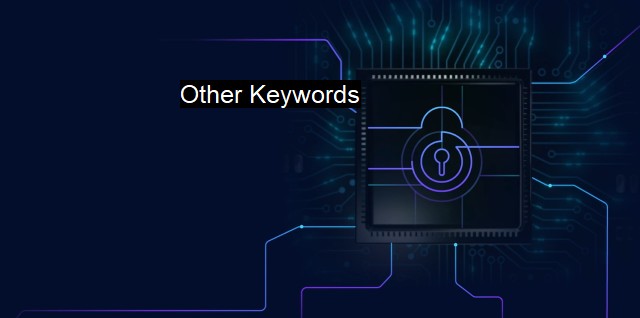What are Other Keywords?
How "Other Keywords" Function in Cybersecurity and Antivirus Software to Keep Systems Secure
In the context of cybersecurity and antivirus software, the term "Other Keywords" may not seem immediately obvious, but they play a crucial role in keeping security systems updated and effective. Other Keywords refer to specific and conscientious terms, phrases, or identifiers used by professionals in cybersecurity or antivirus protection to signify various aspects of the constantly evolving world of cyber threats, malicious software, and defending against them.It is an expansive category that encompasses numerous technical and non-technical terminologies aimed at understanding, classifying, dealing with, and preventing digital threats. Understanding these keywords contributes significantly to the reinforcement of protective measures in digital infrastructures, ensuring that little or no harm comes upon the systems, data, and identities contained within them.
"Other Keywords" in the cybersecurity and antivirus context could encompass a range of different terms including but not limited to malware, ransomware, phishing, botnet, spoofing, spyware, denial of service, firewall, or intrusion detection systems. Each of these terms signifies a particular type of software, process, or technique that can be deployed for cyberattacks or towards securing a system from such attacks.
For instance, malware is a keyword referring to a vast category of malicious programs that aim to steal data, cause damages, or disrupt normal operations. Such programs may take various forms, including viruses, which spread from file to file; spyware which is typically hidden and shares information on online actions back with some unauthorized third-party, or ransomware, which hijacks files or functions until a sum of money is paid to the cybercriminal.
Among other keywords, phishing too, holds significant weight and refers to the action of attempting to acquire sensitive data, often through disguised emails appearing as if sent from a reputable, trustworthy source. Alternatively, a keyword like firewall represents a network security system that monitors and controls incoming and outgoing network traffic based on predetermined security rules, protecting the systems and data within a network accordingly.
Moreover we often encounter other advanced and complex keywords such as "cryptography," "intrusion detection," "intrusion prevention," and "zero-day vulnerabilities." Cryptography is an encryption technique used to secure data from third-party access, where intrusion detection/prevention systems are employed to identify and counteract possible harmful activities within a network.
Together, these "Other Keywords" create a broader ecosystem of cybersecurity and antivirus, allowing an advanced understanding and adoption of precise industry standards. These terminologies constantly evolve as cyber threats and cyber defense techniques are growing in complexity and number. By understanding these keywords, one can grasp fundamental cybersecurity and antivirus concepts to apply and stay safe in the digital world.
Thus, in the wide-ranging and multifaceted cybersecurity environment, "Other Keywords" stand as landmarks in the vast sea of cyber defense terminology. They are crucial to comprehending the challenges faced in this urgent and rapidly developing field. In understanding them, companies, organizations, and individuals improve their resilience against the constant threat of cyberattack, effectively protecting their operations, sensitive and proprietary data, and ultimately their reputation. In the grand scheme, the vigilant understanding and application of these other keywords contribute to general online safety, enabling the continuance of digital operations with optimal assurance against digital threats.

Other Keywords FAQs
What is malware?
Malware is a type of software designed to harm, damage, or disrupt devices, networks or computers. Malware is often used by hackers to steal data, login credentials, and other sensitive information without the user's knowledge.What is antivirus software?
Antivirus software is a program designed to detect, prevent, and eliminate malware from computers and other devices. It does this by scanning your device and comparing the code of files and programs to a database of known malicious code.What is two-factor authentication?
Two-factor authentication is an extra layer of security that requires users to provide two forms of identification before gaining access to a system or account. This can include something the user knows, such as a password or PIN, and something the user has, such as a mobile device or token.What is a Denial of Service (DoS) attack?
A Denial of Service (DoS) attack is a type of cyber attack that aims to disrupt access to a website or network. This is achieved by flooding the target with traffic, overwhelming the server or network, and causing it to become unavailable to legitimate users. DoS attacks can be carried out using various methods, including network flooding, packet fragmentation attacks, and more.| | A | | | B | | | C | | | D | | | E | | | F | | | G | | | H | | | I | | | J | | | K | | | L | | | M | |
| | N | | | O | | | P | | | Q | | | R | | | S | | | T | | | U | | | V | | | W | | | X | | | Y | | | Z | |
| | 1 | | | 2 | | | 3 | | | 4 | | | 7 | | | 8 | | |||||||